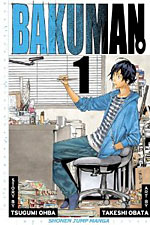 Written by Tsugumi Ohba
Written by Tsugumi Ohba
Art by Takeshi Obata
208 pages, black and white
Published by Viz
It’s a fair statement to say that Tsugumi Ohba and Takeshi Obata’s series Death Note was a huge, career-making hit for them. It would also be a fair assumption by most readers, at that point, to think that Ohba and Obata were set for life in terms of publishers and the world of manga. As their follow-up series Bakuman shows, though, that’s hardly the case in the manga industry. Bakuman is two parts story, and one part manga business world primer, and I am finding it utterly fascinating.
Bakuman has a simple enough premise, with two young students (Moritaka and Akito) that decide to team up and create their own manga series. What Akito doesn’t realize, though, is that becoming a manga creator in Japan is anything but simple, and the end result is a series of lessons in which Moritaka (whose uncle had one hit manga series, followed by a string of failures, and eventually worked himself to death) tries to educate Akito into the ways of the manga publishing world.
Doesn’t sound interesting? Actually, in the hands of Ohba and Obata, it is. Moritaka leads both Akito and us through the real process of becoming a professional manga creator in Japan; how to put a pitch document together, how to storyboard if you’re a writer working with an artist, the kind of reference library you’ll need, the hours put in, the types of pens used to draw manga. At the same time, though, there’s a regular human drama unfolding. Some of Moritaka’s family members are less than pleased with the idea of Moritaka also trying to become a manga artist, and we learn the secret of Moritaka’s uncle and the person that drove him to try and become a successful artist. There’s even a romantic relationship forming amidst all of this, and how it gets used as a lure to try and pull Moritaka forward. It’s a clever series, in part because it never feels like Ohba is lecturing his audience; information is parceled out in a way that feels natural and part of the story.
More importantly, the two main characters have a lot to offer readers. While Moritaka is the romantic and the one with all of the manga know-how, Akito is the instigator and the one with his theories on the rest of the world. Even if you don’t agree with him all the time, it’s fun listening to his theories on topics like the perfect woman, or why it’s important to go to a school that doesn’t match your academic abilities. Akito is simultaneously the comic relief and the voice of the real world, while Moritaka is the more knowledgeable about manga itself. The one character who could still use some fleshing out at the end of the first volume is Azuki, the love interest, who ends up a bit too bland for my taste as she goes along with Moritaka’s slightly ridiculous idea for their potential relationship. I’d like to see her fleshed out a bit, even though it’s increasingly clear that at this stage she’s more of the endgame for the series rather than a concrete, constructive part of Bakuman.
Obata’s art, just like on Death Note and Hikaru no Go, looks great. I love the way he draws characters’s heads and faces in Bakuman, with thick locks of hair and wildly expressive faces. Akito’s face in particular is a direct line into his thoughts and emotions, unable to keep a poker face to save his life. It manages to feel almost stretchy in places, even though Obata never switches into a superdeformed or deliberately exaggerated style throughout the book. Perhaps more importantly, just like Obata was able to make playing a go piece exciting in Hikaru no Go, he’s able to make the creation of manga shine under his own pen. Who knew illustrations of someone creating illustrations could be interesting?
There’s a lot to digest in Bakuman, especially Moritaka’s description of how series are pitched and then survive (or fail), and why almost no one ever gets to rest on their laurels in the world of manga. You get the impression that Ohba is speaking from the heart here, even as he starts up his second published series with Bakuman. If young artists learn a little bit about the manga industry (and indirectly, the comics business culture of other countries, since a lot of this applies elsewhere) I’d consider it a victory. More importantly, though, Bakuman isn’t just informative, it’s fun. This is definitely a series I’ll read more of, and it’s anything but a sophomore slump for Ohba. Ohba and Obata make the mundane seem fantastic here.
Purchase Links: Amazon.com | Powell’s Books
